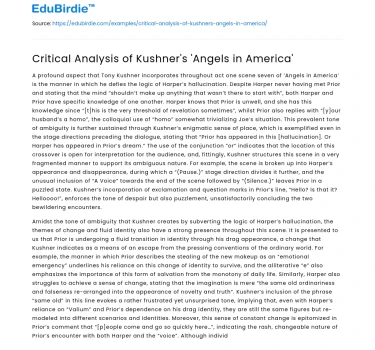A profound aspect that Tony Kushner incorporates throughout act one scene seven of ‘Angels in America’ is the manner in which he defies the logic of Harper’s hallucination. Despite Harper never having met Prior and stating that the mind “shouldn’t make up anything that wasn’t there to start with”, both Harper and Prior have specific knowledge of one another. Harper knows that Prior is unwell, and she has this knowledge since “[t]his is the very threshold of revelation sometimes”, whilst Prior also replies with “[y]our husband’s a homo”, the colloquial use of “homo” somewhat trivializing Joe’s situation. This prevalent tone of ambiguity is further sustained through Kushner’s enigmatic sense of place, which is exemplified even in the stage directions preceding the dialogue, stating that “Prior has appeared in this [hallucination]. Or Harper has appeared in Prior’s dream.” The use of the conjunction “or” indicates that the location of this crossover is open for interpretation for the audience, and, fittingly, Kushner structures this scene in a very fragmented manner to support its ambiguous nature. For example, the scene is broken up into Harper’s appearance and disappearance, during which a “(Pause.)” stage direction divides it further, and the unusual inclusion of “A Voice” towards the end of the scene followed by “(Silence.)” leaves Prior in a puzzled state. Kushner’s incorporation of exclamation and question marks in Prior’s line, “Hello? Is that it? Helloooo!”, enforces the tone of despair but also puzzlement, unsatisfactorily concluding the two bewildering encounters.
Amidst the tone of ambiguity that Kushner creates by subverting the logic of Harper’s hallucination, the themes of change and fluid identity also have a strong presence throughout this scene. It is presented to us that Prior is undergoing a fluid transition in identity through his drag appearance, a change that Kushner indicates as a means of an escape from the pressing conventions of the ordinary world. For example, the manner in which Prior describes the stealing of the new makeup as an “emotional emergency” underlines his reliance on this change of identity to survive, and the alliterative “e” also emphasizes the importance of this form of salvation from the monotony of daily life. Similarly, Harper also struggles to achieve a sense of change, stating that the imagination is mere “the same old ordinariness and falseness re-arranged into the appearance of novelty and truth”. Kushner’s inclusion of the phrase “same old” in this line evokes a rather frustrated yet unsurprised tone, implying that, even with Harper’s reliance on “Valium” and Prior’s dependence on his drag identity, they are still the same figures but re-modeled into different scenarios and identities. Moreover, this sense of constant change is epitomized in Prior’s comment that “[p]eople come and go so quickly here…”, indicating the rash, changeable nature of Prior’s encounter with both Harper and the “voice”. Although individually Harper and Prior struggle to achieve a sense of change, it is the encounters themselves that remain unstable.
Save your time!
We can take care of your essay
- Proper editing and formatting
- Free revision, title page, and bibliography
- Flexible prices and money-back guarantee
Did you like this example?
Make sure you submit a unique essay
Our writers will provide you with an essay sample written from scratch: any topic, any deadline, any instructions.
Cite this paper
-
APA
-
MLA
-
Harvard
-
Vancouver
Critical Analysis of Kushner’s ‘Angels in America’.
(2023, April 21). Edubirdie. Retrieved December 22, 2024, from https://edubirdie.com/examples/critical-analysis-of-kushners-angels-in-america/
“Critical Analysis of Kushner’s ‘Angels in America’.” Edubirdie, 21 Apr. 2023, edubirdie.com/examples/critical-analysis-of-kushners-angels-in-america/
Critical Analysis of Kushner’s ‘Angels in America’. [online].
Available at: <https://edubirdie.com/examples/critical-analysis-of-kushners-angels-in-america/> [Accessed 22 Dec. 2024].
Critical Analysis of Kushner’s ‘Angels in America’ [Internet]. Edubirdie.
2023 Apr 21 [cited 2024 Dec 22].
Available from: https://edubirdie.com/examples/critical-analysis-of-kushners-angels-in-america/
copy






 Stuck on your essay?
Stuck on your essay?

